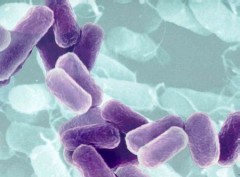THE INTESTINAL FLORA: WHAT ARE BACTERIA
Supplements to promote intestinal well-being
The composition of bacteria living in the human gut is something unique and different for each individual. It is estimated that in the intestine of an adult man there is about 1.5 kg of microorganisms, mainly bacteria, which are combined in the intestines of each person in a particular way, so no two individuals hosting the exact same mix of microorganisms.

These organisms support many fundamental processes of life, such as absorption of various nutrients, production of some vitamins and the immune system. The intestinal flora is therefore essential to the functionality of the human body.
The microorganisms that form the intestinal bacterial flora are not innate in humans. At birth, in fact, the gut is sterile. Within a few minutes after delivery, however, began the colonization by the bacteria present in the mother and the surrounding environment. To understand, one can compare the sterile intestine of the newborn in a stadium with billions of seats empty. Shortly after birth, the bacteria immediately begin to fill the available space, leaving little room for physically potential pathogens for initiation and proliferation. Those who can not find a place on the intestinal mucosa, are expelled directly. In addition, the "good" bacteria consume much of the nutrients present in the gut, removing then to those pathogens. The intestinal bacterial flora functions as a defensive barrier, capable of modifying the intestinal environment and make it unfavorable to the proliferation of pathogens, for example with an acid pH. This function is carried out just from the first moments of extra-uterine life, when the intestinal flora begins to form.
The flora is not always stable. The first big change occurs with weaning, ie the transition from a diet of milk only to a more varied with solid foods. Then the flora adapts and changes, while maintaining its basic appearance. Under normal conditions, in fact, does not change significantly, even if the concentration of the various species that comprise it may temporarily vary due to different environmental factors, physiological and pathological. In any case, the final human flora consists mainly of anaerobic bacteria (for example Bacteroides, bifidobacteria) that are much more numerous than those aerobic (such as Escherichia and lactobacilli).
For the welfare of the whole organism is essential balance between the different species of flora. In it, in fact, there are essentially three main groups:
- Harmful bacteria (such as Pseudomonas aeruginosa, Staphylococcus, Clostridium, Proteus, Veillonella);
- Neutral bacteria become harmful only under certain conditions (Escherichia coli, enterococci, streptococci, Bacteroides, Eubacterium);
- Good bacteria (belonging to the genera Lactobacillus, Bifidobacterium)
Under normal conditions, the harmful microorganisms are kept under control by the entire bacterial flora. But it is not always the case.
Occur at times of alterations in intestinal flora, caused by eg antibiotics, or in situations of immunodeficiency, physical and emotional stress.
Although age and sudden changes supply or malnutrition can affect the composition and activity of the intestinal flora.
The first rule to promote the efficiency of the intestinal flora is to maintain a healthy diet and try to eliminate the conditions that led to the alteration.
Is also a great help from probiotics, ie the integration of oral "friendly bacteria" that can come alive and vital in the intestine after passing the barriers formed by stomach acid and digestive secretions and capable, if taken regularly, positively influence the intestinal ecosystem. The studies carried out in recent years have highlighted a number of positive effects of probiotics on the human body, ranging from help maintain balanced intestinal flora to support intestinal function to reinforce the immune system. These important properties, however, vary from strain to strain of probiotic and also depend on the amount of probiotic ingested.
See also
Probiotics, prebiotics
Supplements to promote intestinal well-being
Bibliography
1 Eckburg P, Bik E, Bernstein C, E Purdom, Les Dethlefsen, Sargent M, Gill S, Nelson K, Relman D. Diversity of the Human Intestinal Microbial Flora Science Express, 14 april 2005.2 O'Hara A, F Shanahan The gut flora as a forgotten organ. EMBO Rep 2006 7 (7): 688-933 GR Gibson, MB Dietary modulation Robertfroid of the human colonic microbiota: introducing the concept of prebiotics. J. Nutr. 1995, 125:1401-124 Gasbarrini A. In addition diverticular disease: SIBO Congress Reports XI National Congress of Digestive Diseases, March 14, 2005
